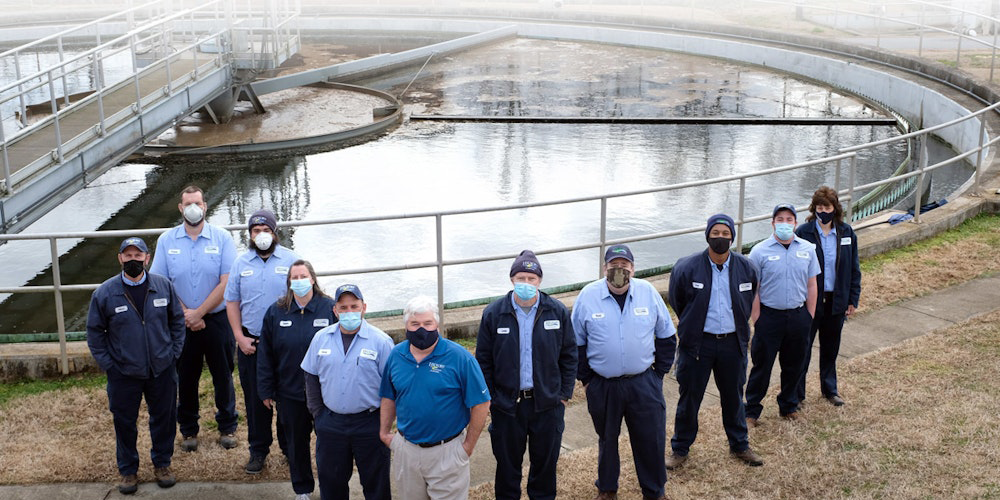A North Carolina team finished a major plant upgrade with no shutdowns. The new equipment and technologies now serve them well.
It was a little like trying to put on a new shirt while removing the old one, without baring any skin in the process.
As part of a major facelift in 2012, the Northeast Wastewater Treatment Plant in Hickory, North Carolina, had to upgrade and improve all its old processes without missing a beat and staying in compliance.
“Some of our equipment dated to the 1960s, and the original plant was built in 1940,” says Keith Rhyne, superintendent. “Some of it was falling apart.” The plant, far out in the country when built, is now hemmed in by new developments; the tight footprint was a limiting factor.
But it all worked out, thanks to a dedicated management and operations team. They received the North Carolina AWWA-WEF Operations and Maintenance Award in 2019 for that and other efforts to serve their communities with clean, compliant effluent.
“I think the key was communication and collaboration between the contractors, engineer and staff,” Rhyne says. Even though many of the staff members on hand for the upgrade have retired, their example lives on in their replacements. The goal then and now is to provide clean water, educate the public about the value of wastewater treatment, and support the city’s programs of teamwork and customer focus.
Challenging upgrade
Rhyne recalls the process to upgrade the old facility, starting in 2002 and concluding with the refurbished facility in 2012. “At first, our bids were way too high — $38 million,” he recalls. “We went back to the drawing board and cut out some things to make the project more affordable.” The revised bid was around $23 million, and the project got the green light.
“We decided to use as many of the existing structures as possible,” Rhyne says. “It was challenging for our operators because we couldn’t shut anything down as the new construction went along. How do you rebuild a clarifier while it’s still in use?”
Temporary power, temporary pumping and temporary disinfection enabledthe transformation. The headworks building was reused for equipment storage. The return activated sludge building stayed and was re-equipped inside. Eliminating the primaries opened up space for the new oxidation ditches.
But it was communication that really led to success. “Operators were constantly asked what they thought about an upcoming plan or phase,” says Rhyne. “We did it, it worked, and we had no violations. As we ran the old process, we trained up on the new. That was good.”
A modern process
Today, the Northeast Plant (6 mgd design, 3 mgd average) serves about 40,000 people. Flygt pumps (a Xylem brand) bring the influent to the preliminary treatment area, equipped with Vulcan bar screens and a Smith & Loveless grit removal system.
Then the flow moves to the oxidation ditches, an Ovivo A2C system that operates with anaerobic, anoxic and aerobic zones. While the plant has no permit limits for nitrogen and phosphorus now, Rhyne expects that to change. The plant will be ready, as it already reduces total phosphorus to less than 0.5 mg/L and TKN to 4 to 5 mg/L.
Secondary clarifiers (WesTech Engineering) settle the treated water, and a Capital Controls system provides chlorination-dechlorination. Effluent is discharged through an aerated channel to Hickory Lake, a reservoir on the Catawba River. Biosolids are pumped to a Charter Machine gravity belt thickener by rotary lobe pumps (Boerger). The material at about 4% solids is trucked to a composting site.
Hach samplers keep the staff informed of wastewater conditions, and a Rockwell Automation system controls process equipment. The plantwideSCADA is from MR Systems. Two types of odor control are in operation.A carbon adsorption system (Pure Air Filtration) scrubs air from the grit removal area, and biological controls (Azzuro) are installed in the solids building.
Quality workplace
The Hickory facility is staffed 24/7 with nine certified operators doing eight-hour shifts during the week and 12-hour shifts on weekends and holidays. Six serve the first day shift, including Mikeal Farr, senior plant operator/supervisor; Shane Eckard, Paul Solomon II, Sabine Wagner and Lonnie Laird, operators; John Sain, maintenance; and Doug Kirby, heavy equipment operator. Heidi Fox and Brandon Burdett are on second shift; Randy Keene is on the third.
An electrical support group is offsite and available for work Rhyne calls “very helpful.” Six team members work in the laboratory, which conducts sampling and testing for all five plants that serve the greater Hickory area. David Cox is pretreatment coordinator, and Paula Prestwood is lab supervisor.
“This is a good place to work,” says Rhyne. “It’s well run and new, and we frequently host regional operators’ meetings.” While many members of the original crew have retired or are about to, the city has attracted a good crop of applicants for open positions. “We may not get as many applicants as we used to, but the ones we see are good candidates,” Rhyne says. “They are willing to go the extra mile.”
Valued contributors
The new technology helps, as well. Rhyne remembers when controls consisted of a panel and red and green lights that flashed on and off. The technology may have seemed intimidating at the beginning, he says, but once it’s learned, the benefits are obvious.
That effort reflects the city’s new credo called “Be CITY.” The C stands for customer focused, the I for innovative, the T for teamwork, and the Y for you. “It’s designed to emphasize being the best you can be and helping the city succeed in the process,” Rhyne says. “We follow those guidelines.”
Rhyne and the staff felt they were making a contribution when they received the Operations and Maintenance Award from fellow clean-water professionals. “The city recognized us at one of their monthly council meetings,” Rhyne says. “The workers felt very proud, but what really made me proud was knowing I work with such a great team, all the way up and down the ladder.”

